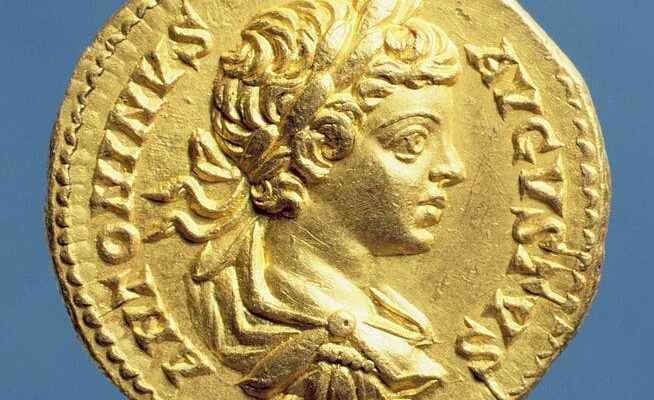The court has acquitted a 58-year-old wealth manager who sold stolen ancient coins of receiving stolen goods and money laundering.
Among other things, a coin of the Roman Emperor Caracalla (196-217 AD) is at stake in the trial before the Zurich District Court.
Not only the case itself seems obscure, but also the background: In October 2012, a man bought seven ancient coins at the Numismatica Ars Classica auction in the Hotel Baur au Lac for a total price of 440,000 francs. The next day he took the train to Martigny. He is said to have fallen asleep. The seven coins bought at auction and an eighth coin worth 26,000 francs are said to have been stolen from him while he was sleeping. The man reported the theft to the Valais canton police. There is a police record of this.
Ten years later, a 58-year-old Zurich asset manager is the accused before a single judge. He is accused of multiple, sometimes attempted, stolen goods and money laundering. The eight missing coins turned up in autumn 2020. The seven coins from the auction are not specified in the indictment. The eighth is a Roman coin with the face of Emperor Caracalla.
Five coins resold for 36,500 francs
According to the indictment, the accused accepted the “Caracalla” coin from an unknown Algerian in September 2020 in a Zurich second-hand shop for luxury goods. On the same day he sold it to a numismatist for 9,000 francs. In November 2020 he is said to have received four more coins in the shop. He also sold this to the same numismatist for 27,500 francs. He offered the three remaining coins to the numismatist. But he refused. The asset manager is said to have received 3,000 francs from the seller for the mediation.
The indictment states that the accused allegedly told the numismatist that he had owned the coins since 2005 and was selling them for a third party whom he had known for a long time. The public prosecutor is demanding a conditional fine of 150 daily rates of CHF 200 each for a probationary period of two years. On the fringes of the process, it is revealed that the eight coins have since been returned to the sleepy train passenger. The process cannot clarify where they were for eight years.
As in the investigation, the accused refused to make any statement in front of the district court, either personally or in relation to the matter. He does not say what role he held in the luxury thrift store, whether it was a normal type of business, whether he had any “odd feeling” about it, and whether he did any research.
Defender doubts theft
His defense attorney is requesting an acquittal. First of all, there is nothing at all that underpins the plausibility of the 2012 theft story. The prosecutor returned the coins to the man without checking legal ownership. If someone had acquired the coins in good faith in the meantime, the five-year period for reclaiming them would have expired.
Such services as brokering the coins are common for the asset manager. He doesn’t understand anything about coins, which is why he turned to an expert, explains the defense attorney, and denies that the asset manager gave the numismatist false information. The numismatist probably told the untruth so as not to be accused of violating the duty of care. The accused had no intent. Negligence is not punishable in the case of receiving stolen goods and money laundering.
The single judge does in fact give an acquittal. She corrects the defense counsel to the effect that ancient coins are cultural assets for which a period of thirty years applies if they are acquired in good faith. However, the judge states that it cannot actually be proven that the asset manager gave false information to the numismatist.
He went to an expert precisely because he was unfamiliar with coins. If he had suspected that the coins had been stolen, he would certainly not have turned to an expert who, after all, has access to databases, according to the single judge. The behavior may be negligent, but negligence is not punishable.
Judgment GG220196 of December 5, 2022, not yet final.
